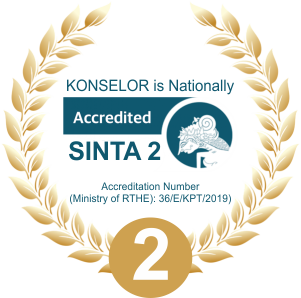Perbedaan Kematangan Karier Mahasiswa Tahun Masuk 2014 Fakultas Ilmu Pendidikan Universitas Negeri Padang ditinjau dari Gaya Pembuatan Keputusan dan Jenis Kelamin
 ), Daharnis Daharnis(2), Marjohan Marjohan(3),
), Daharnis Daharnis(2), Marjohan Marjohan(3), (1) Universitas Negeri Padang
(2) Universitas Negeri Padang
(3) Universitas Negeri Padang
 Corresponding Author
Corresponding Author
Copyright (c) 2017 Konselor
DOI : https://doi.org/10.24036/02015426456-0-00
Full Text:
 Language : en
Language : en
Abstract
Career maturity is readiness of individuals to deal with the tasks of the development of his/her career. Student’s development career task is make his/her education as a career direction. This study aims to describe career maturity of the Faculty Education Universitas Negeri Padang students class 2014, according to decision making style and gender. Population of this research is 336 students of Faculty Education Universitas Negeri Padang, with samples are 183 students choosen by proportional random sampling. The instruments used in this research is the career maturity scale and Assessment of Career Decision Making of Harren (1979). The results of this research are: 1) student’s career maturity are different significantly according to decision making style, 2) student’s career maturity aren’t different according to gender, 3) there isn’t interaction of decision making style and gender in explaining student’s career maturity.
Keywords
References
Blustein, D. L. (1987). “Decision Making Styles and Vocational Maturity: an Alternative Perspective”. Journal of Vocational Behavior, 30, 61-71.
Gati, I. & Levin, N. (2014). “Counseling for Career Decision Making Difficulties: Measures and methods”. Journal of Career Development Quarterly, 62, 98-113.
Harren, V. A. (1979). “A Model of Career Decision Making for College Students”. Journal of Vocational Behavior, 14, 119-133.
Herr, E. L., & Cramer, S. H. (1992). Career Guidance and Counseling Through the Life Span: Systematic approaches. New York: HarperCollins
Lawrence, W & Duane, B. (1976). “An Investigation of Intelligence, Self-Concept, Socioeconomic Status, Race, and Sex as Predictors of Career Maturity”. Journal of Vocational Behavior, 9, 43-52.
Ohler, D. L., Levinson, E. M., & Damiani, V. B. (1998). “Gender, Disability and Career Maturity Among College Students”. Journal of special Services in the Schools, 13, 149-160.
Safitri, H. M. (2014). “Prestasi Belajar Ditinjau dari Gaya Pengambilan Keputusan Karir pada Mahasiswa”. Jurnal Online Psikologi, 2(02).
Sharf, R. S. (2010). Applying Career Development Theory to Counseling. Pacific Grove, United State of America: Brooks /Cole Cengage Learning.
Suranata, K. (2009). “Hubungan antara Kesesuaian Tipe Kepribadian dan Model Lingkungan dengan Kematangan Arah Pilihan Karier; Studi pada siswa kelas XII di SMK N 1 Padang”. Tesis tidak diterbitkan. Padang: Universitas Negeri Padang.
Yon, K. J., Jeong, J. R. & Goh, M. (2012). “A Longitudinal Study Of Career Maturity of Korean Adolescents: The effects of personal and contextual factors”. Journal of Asia Pasific Education, 13, 727-739.
 Article Metrics
Article Metrics
 Abstract Views : 862 times
Abstract Views : 862 times
 PDF Downloaded : 471 times
PDF Downloaded : 471 times
Refbacks
- There are currently no refbacks.
Copyright (c) 2017 Konselor

This work is licensed under a Creative Commons Attribution 4.0 International License.







